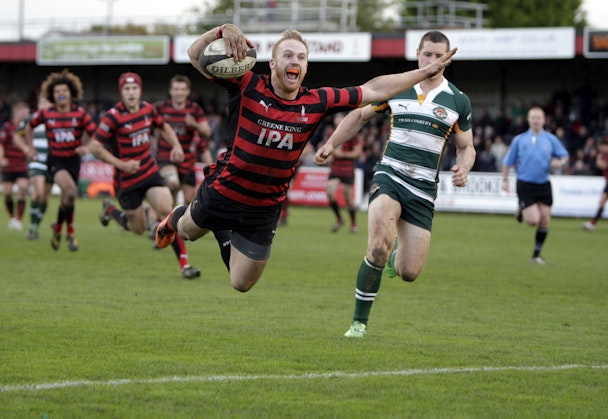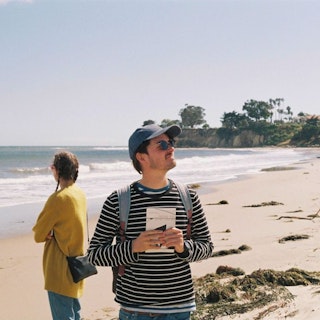What I learned… as a professional rugby player, with Geoff Griffiths of Builtvisible
Talent in the marketing industry comes from every corner of the globe and some surprising disciplines. In our new series What I Learned... we explore the surprising origin stories of some of agencyland’s biggest characters and brightest stars.

Builtvisible’s Geoff Griffiths playing for semi-professional club Blackheath / Image courtesy of Helen Watson - Instagram.com/hjwatso
Before Geoff Griffiths of Builtvisible ever worked in digital, his workplace was the rugby pitch. He told us about the transition from drop goals to digital, and how a background in elite sports has helped him to build a career and grow an agency.
Hi Geoff. Tell us a little about who you are and what you do.
I’m the chief executive officer and owner of Builtvisible, a digital marketing agency. In a past life, for eight years, I played as a winger and fullback in the RFU Championship, the second tier of English rugby.
Did you grow up playing rugby?
I started playing when I was about 14. I had the choice at 18 of whether to go to university or pursue rugby, and I decided to do both. I graduated in 2008 during the financial crisis and there wasn’t much going on job-wise, so I was lucky to find a full-time gig playing rugby, with Plymouth Albion down in Devon.
I did that for a couple of years but eventually decided that full-time rugby wasn’t the thing for me – I’d had a couple of injuries and it was a bit unfulfilling. It seems like the dream: two hours a day of work, sitting around having a lot of coffee and doing a lot of training. But it wasn’t. So I decided to transition out of sport slowly.
Luckily, in the Championship, some teams are part-time. So I moved to Esher and began a career in digital while playing part-time.
Were you pulled by digital or feeling a push away from rugby?
There was definitely some self-awareness that I probably wasn’t good enough to make it into the very top flight. The other side was that it was a little boring.
I was writing a column for the BBC, documenting my rugby. That got me more interested in digital and (more egotistically) how to get more people to look at that column. At Esher, I landed a job doing business development and marketing for an agency. I decided to move to digital full-time, going to Agenda21 [now Walk-in Media] for a couple of years.
Then I decided to grow by specializing. I wanted to find somewhere small and grow with it – that’s when I joined Builtvisible as a consultant. The plan worked: there were 10 of us at the time and now there’s 60.
How did the elite sportsperson stay with you as you worked your way up?
Digital marketing agencies are people businesses. They’re teams, and you have to work out how to work with people, both internally and externally. I think the competitor thing is always there – I want to win, but that’s just an outcome. The main thing that rugby has driven for me is how to build a team, unify people behind a vision and have people understand that we’ve got to be good human beings, support each other and call each other out when we need it.
How about rugby in particular? Is that sport still in your DNA?
In rugby, you’re there to do a very specific thing on game day. Around that, you control everything you can: training, diet, preparation – but sometimes you turn up on Saturday and, for whatever reason, it doesn’t work. We would play on a Saturday and, win or lose, we’d be in on a Monday scrutinizing hours of video, asking, “what could we have done better?” – not to criticize anyone but to identify opportunities to learn.
You learn to separate processes and outcomes, which has been key for me in agency life. In agencies, you have ups and downs. You’re going to win and lose clients. Being able to separate the outcomes that you produce from how you feel about yourself, not getting too bogged down in it and always looking for opportunities to learn is massive.
I’ve seen what bad looks like too, with people tying too much in with the win or the loss, and losing perspective, believing the hype of a good run or getting down in the doldrums of a bad run.
How has that made things better for your agency?
We focus on what’s in our control – can we control the ‘controllables’? Are we doing everything we can to do the things we want to do? The results, I think, say that we’ve been able to do that. We’ve got clients that we’ve worked with since 2012. 95% of our revenue is from long-term, retained clients. That’s not because it’s something we’ve aimed to do – it’s just that we’ve done the right things and learned very quickly and looked at things with a real self-awareness.
It’s the same thing with people – average staff turnover is around five years, which for an agency is mad.
And I’ve heard you use your experience to advise other sportspeople?
I do a lot of work around transitioning from sport – with people who are in sport and on the edge of that cusp. My advice to the people that I speak to all the time is to give yourself options, because your career could end any day. It’s tricky because in professional sport it’s about head-down commitment, but equally you’ve got to protect yourself and explore other avenues.
Content created with:

Builtvisible
We connect a digital society.
Made possible through technology, made personal through data, made powerful through content. Bringing people, communities and...

